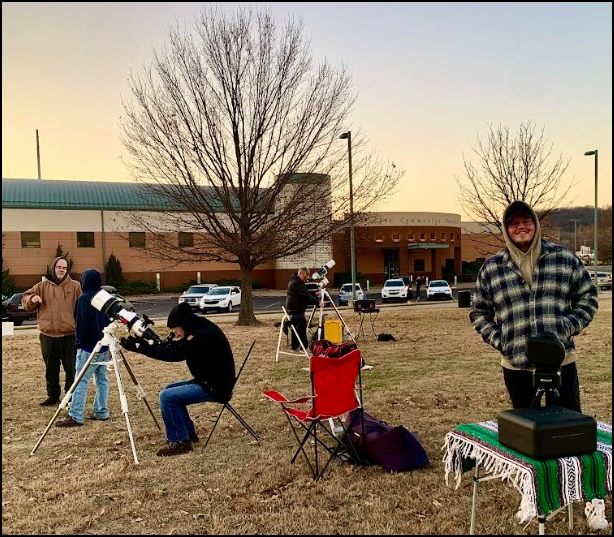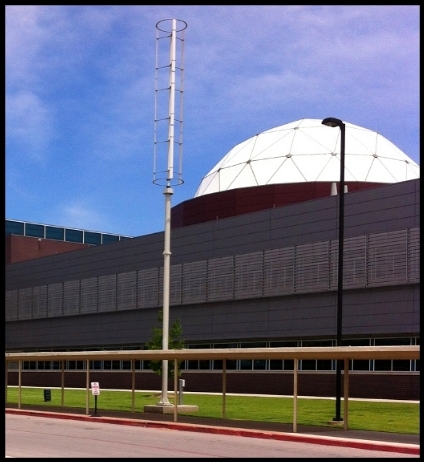Star Party Etiquette
Drive Slowly
Save our telescopes! Be kind! Please drive slow enough to avoid pedestrians and to keep the dust down at all times.
No Smoking On The Observing Field
Smoke damages telescope optics and can cause sensitive individuals to suffer allergic reactions.
No Consumption Of Alcoholic Beverages
It's hard enough stumbling around in the dark while you're sober!
No Aerosol Sprays On The Observing Field
One drop of spray can permanently damage telescope optics. Apply any sprays in the parking area before approaching the telescopes. Please do not apply insect repellent spray or use any other aerosol spray on the observing field. Lotions and roll-ons are fine.
No Pets
Many animals become afraid and confused in the dark and/or crowds of people. For the safety of the public and your pet, please leave them at home.
No White Lights
White light ruins the dark adaptation that your eyes develop after about 20 or 30 minutes in the dark. You will need this dark adaptation to see faint, deep sky objects. When a white light is used after dark anywhere in the vicinity of the observing field (flashlights, car headlights, even a match) it takes up to 30 minutes for everyone to regain their night vision. Once your eyes adapt to the darkness, you will be able to find your way around and avoid obstructions without needing a flashlight.
How to Make an Astronomy Friendly Light:
The best solution is to use a red filter or lens on flashlights, or to buy a special red LED light. However, it is very simple to adapt a regular white flashlight to make it friendly to your eyes. All you need to do is cover it with anything red. Applying several coats of red fingernail polish to the flashlight lens is an inexpensive way to make a permanent astronomy light. Temporary astronomy lights can be made by covering a regular flashlight with a thick layer of non-flammable red paper or plastic and securing it with a rubber band. Some materials that can be used are listed below:
- Red plastic gift basket wrap
- Red brake-light tape
- Small patch of red cloth
- Printed page of solid red on your inkjet printer
No Flash Photography
The bright strobe of a camera flash can destroy everyone's night vision for 45 minutes to an hour. Photographs taken under dark conditions, even with a flash, generally do not turn out well, anyway, unless you're using special film and camera settings.
Watch Your Children
Children are always welcome at all of our star parties. But, since the observing field is dark, small children are more likely to trip and get hurt, become lost, or bump into and damage expensive equipment. If you do bring children, be sure they stay with you at all times. If they're very small and they start crying, take them back to your car until they can be quieted down. Many children become cranky if they stay up too late, but are happy to sleep in the car if they have a blanket and their favorite toys.
Ask Before Touching
Some astronomers may be adjusting their equipment or doing delicate astrophotography, or the telescope may not be aimed at any object in particular. So, please ask before touching or moving a telescope or other equipment. But don't be afraid to ask. Never touch any glass optical surface.
Be Clean
Be sure to properly dispose of all trash so that we continue to be welcome in the various parks. In most cases we are given special treatment, such as access after hours, and access to parts of the park not open to the public. This has been earned over the years, and not all astronomy groups are allowed the privileges.
Observing At A Star Party
Once the observing is underway, feel free to go from scope to scope and talk with everyone. They'll be more than happy to let you look through their scopes, and will also be glad to talk about the telescope, what they're looking at and anything else that interests you. This kind of discussion and chitchat is expected at star parties, particularly from visitors; don't feel that you are imposing on them. Most star party attendees will "make the rounds" at least once during the night to see what others are looking at and what kind of equipment they brought; feel free to join in.
Don't Be Afraid to Ask
Likewise, don't be afraid to ask questions about what's in the sky, where different constellations are or anything else. Astronomers, particularly amateur astronomers, are used to questions like that and they typically enjoy explaining such things to other people.


